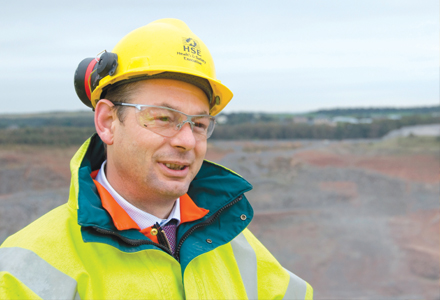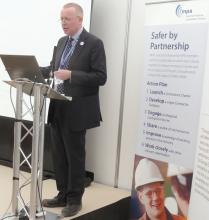
The UK's Health and Safety Executive is adding focus for quarries with the formation of a new Quarries National Inspection Team. Claire Symes met with Colin Mew to talk about the new approach
Efforts from the aggregates industry and regulator the
The man charged with heading up the new team is HSE principal inspector Colin Mew and it is clear he is enthused by the new approach. Since October last year Mew and his five-strong team have been working with a national remit, which replaced the previous regional structure.
"Until recently, the set-up was that there are divisions within HSE and field operations are divided based on geographic area and responsibility for overseeing quarries were assigned to the regions," said Mew. "For example, Wales and the South West had three quarry inspectors but they were managed regionally and there was no central management. This meant that it wasn't easy to transfer knowledge between regions.
"The national interest group for quarries, which used to have three senior staff, was aimed at developing policy. The regional inspectors then had to take the policy and apply it but there was no central back-up as the inspectors were answerable to the region."
Passion for quarrying
Talking to Mew it is clear that the aggregates industry is one that is close to his heart and he is pleased to be part of the new approach.
"Some of my earliest memories are from being around the slate quarries in North Wales," he explained. "The quarrying industry runs in my family and I also have a relative who worked in South Africa in a gold mine. It was a very natural path for my career to take.
"I was lucky to have the opportunity to be a sponsored student at Doncaster for the Higher National Diploma (HND) in Quarrying with ARC Southern, which is now part of
"I really like the way quarrying combines academic understanding with an engineering background. The combination was important to me, as was the opportunity to gain a degree." After graduation Mew worked for ARC, mainly in the South West and his first management position was in Taunton. Mew left ARC to join RMC - now part of
It was in 1993 that Mew made the move to the HSE. "It looked to be an interesting job and one that I had an understanding of after being subjected to a number of inspections," he said.
Mew said that he was lucky to have had the chance to meet John Crabbe through a number of inspections of quarries where he had worked. (The UK's
"It is the lack of competence and knowledge that leads to accidents and I hoped, through constructive inspections, to be able to help change that." His first HSE posting was in Bristol and at that time the organisation had 13 quarry specialists.
"But I didn't see a quarry for six months after joining the HSE - they wanted me to have a wider grounding than just the industry I had come from," he said. "During that time I worked in construction and manufacturing. It was all part of a process to get me into HSE-thinking and to get me into the mindset of a regulator."
New approach
According to Mew, it was five years ago that it was recognised that the resources available for inspecting quarries were dwindling due to retirements. "Also, within HSE the wealth of different career opportunities meant that people often moved roles," he said. Mew himself spent sometime working with the steel industry but quarrying is where his heart lies.
"In essence we had lost experience and skills and there was a view that there was a need to capture what we did have, and ring fence it somehow," said Mew. "There were several attempts to form a team.
"The first was to leave the inspector in the division but to ring fence time for quarrying work. But this was not effective as it is always divisional responsibilities that impact on time - in South Wales there are two steel works so that was always the main focus. Also, there was no way of making their work accountable centrally." This attempt was followed by lobbying from with the HSE and also by trade bodies, such as the MPA.
"It was recognised at field operations level by David Ashton that there was a need to do something and the idea was championed by Terry Rose in South Wales. He set out the problems and the risk of losing respect as a competent body.
"He presented the options as he saw it - we either developed a virtual team or established a real team." Mew first became involved in early 2009 when he was asked to form a team with the same mandate as any other field operations division team with inspectors and principal inspectors and a director with a national remit.
Mew is the principal inspector, while Bernard Warden is head of operations for quarries and Scotland and Dr Paul Stollard is the divisional director. "My team of inspectors and I have quarry knowledge but that is not the whole part of the need for a regulator," he said.
Nationally Mew has a team of five inspectors but they do not cover the same regions as the conventional divisional structure of HSE.
The new structure has now been in place since October 2009 and Mew said that the only challenges have been minor thanks to the strength of the team. "Between us we have over 100 years of experience within the industry and as regulators.
"The main challenge was earlier in the development when we were trying to adapt the regional management model and its systems for the national scale." According to Mew, the main benefit of the new structure is that quarry operators can build better relationships with the inspectors. "They can provide proactive advice and support more effectively this way," he said. "But the companies must be prepared to work with us too.
Proactive partnering
"The consolidation of the UK quarry sector has helped and we are trying to work in a different way with larger companies. When we had the regional structure, these national businesses were not sure of the different focus taken by different regions but now we have identified lead inspectors for the larger operators. This provides consistency and captures the expertise, removing any regional bias."
The policy section for quarries remains separate from the field operations and will continue to provide ideas for campaigns, new initiatives and guidance. Looking ahead, Mew has said that the main focus of the next six to 12 months is poor performers in a bid to create a level playing field.
Nonetheless, the group will also be working with good performers to find better ways of working. "We are looking at aligning with specific individual company's plans for health and safety improvement to prevent us applying a conflicting approach," explained Mew. "We are looking at ways to work together on this at an earlier stage and we have indentified two or three organisations that could fit this model.
"The aim is to have a small team working on this new approach and field test the concept to learn from the process. If successful, it would allow the inspectors to apply their time where it is needed most."









